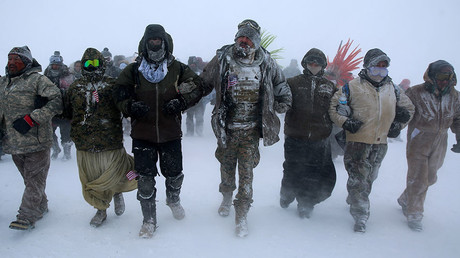DAPL protesters sued for being ‘eco-terrorists’ by company behind pipeline

Energy Transfer Partners, the corporation behind the Dakota Access Pipeline, has sued Greenpeace and other environmental groups for “eco-terrorism” over their protests against the controversial pipeline.
According to the Dakota Access Pipeline company, environmental groups launched an “eco-terrorism campaign” against the pipeline, and engaged in “acts of terrorism,” including soliciting donations and interfering with construction, damaging its “critical business and financial relationships,” Reuters reports.
In a 231-page lawsuit filed Tuesday, the group claims the protests and negative publicity for the pipeline cost the company millions of dollars. It is seeking treble damages which could come to $1 billion, the Grand Fork Herald reports, along with further punitive damages. The lawsuit also seeks a court order to prevent the groups from conducting more protests.
The firm representing the Texas-based ETP is Kasowitz Benson Torres & Friedman, whose founding partner, Marc Kasowitz, is President Donald Trump’s personal lawyer. Trump was an ETP shareholder before selling his stake in December 2016.
The filing accuses the environmental groups, including Banktrack and Earth First, of “violating federal and state racketeering statutes and constituted defamation and tortious interference with business.”
It also claims the groups were guilty of “manufacturing a media spectacle” over the North Dakota protests.
Protests received mainstream media coverage after private security hired by the pipeline set dogs on protesters and fired tear gas, and video of the incident was shared by Democracy Now.
The lawsuit, however, argues accusations of excessive force being used and of sacred land being damaged during construction are simply “a series of false, alarmist, and sensational claims,” made by the “rogue eco-terrorist groups.”
The $3.8 billion Dakota Access Pipeline goes from west North Dakota to south Illinois. Its path under Lake Oahe sparked demonstrations due to its proximity to the Standing Rock reservation and fears that the pipeline could leak and pollute the drinking water. In January, Trump issued a presidential memorandum to expedite the approval for the unbuilt section of the pipeline, and it began service in June.
ETP has a history of leaking pipes and has experienced a series of leaking pipelines since the Dakota Access Pipeline controversy began.
Its Rover pipeline leaked in Ohio wetlands in April, and the Dakota Access Pipeline itself spilled over 100 gallons in two separate incidents in North Dakota in March, as well as another incident in South Dakota in April.



0 Comments:
Post a Comment
Subscribe to Post Comments [Atom]
<< Home